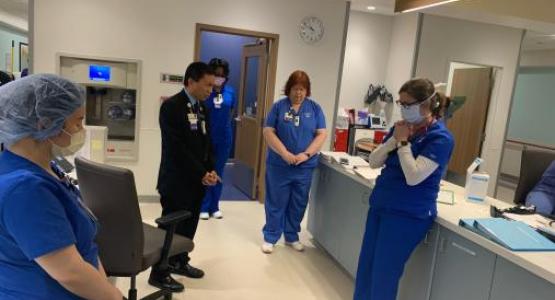
As Pandemic Hits Home, Members Adjust to New Normal
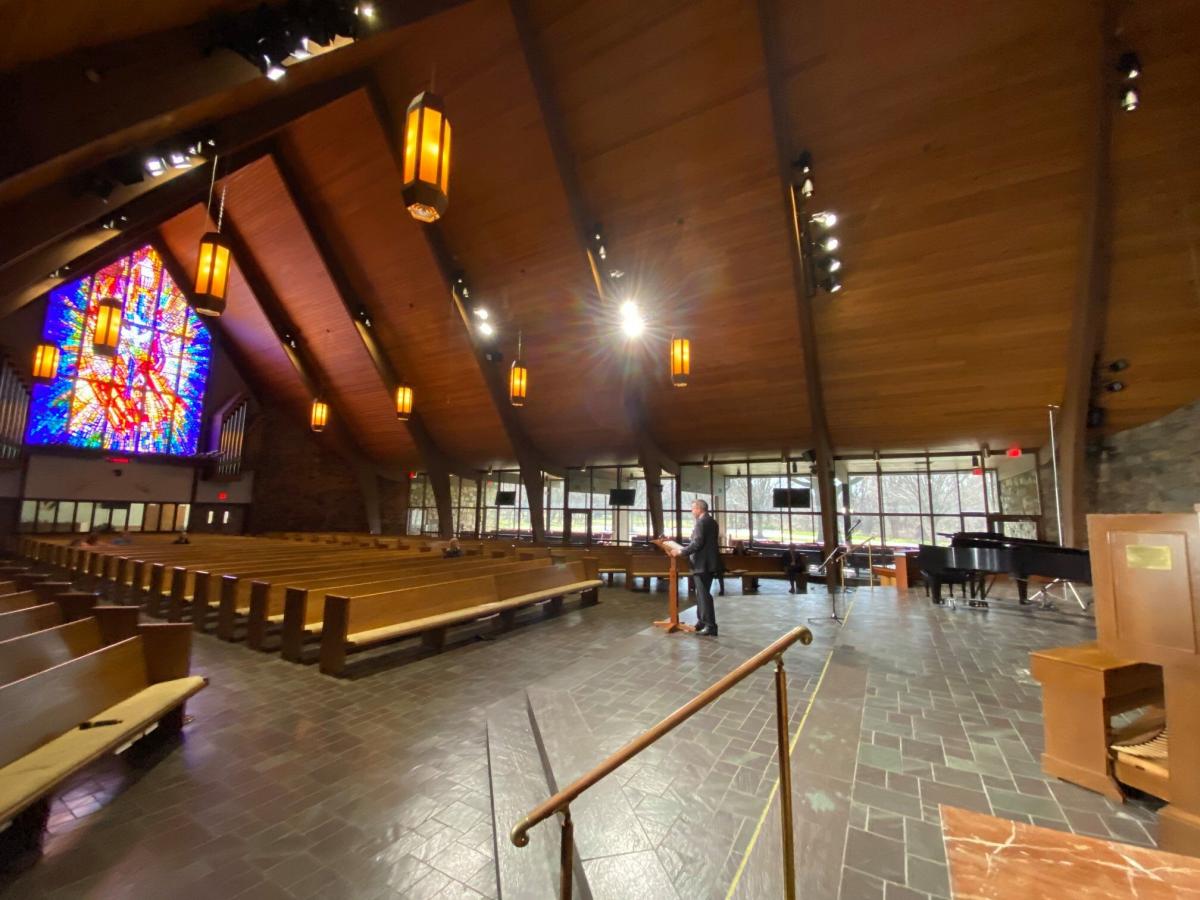 Story by V. Michelle Bernard
Story by V. Michelle Bernard
With all churches across the Columbia Union Conference physically closed due to the coronavirus, pastors and members changed—seemingly overnight— the way they minister. In addition to offering livestreamed or pre-recorded services, many churches and conferences moved planning meetings, Sabbath School classes and Bible studies to Zoom, Facebook Live or other digital video platforms.
Jairo Melgar, the pastor of Ohio Conference’s Akron Hispanic, Youngstown Hispanic and New Philadelphia churches, says it’s a difficult time to be a pastor, balancing church members’ needs and carefully respecting government recommendations.
“In a week, I had to learn how to do videos and make my members feel that I’m there for them, try to make them feel safe,” says Melgar, who started streaming services to YouTube.
Big churches also shifted their ministry.
Pastors at Chesapeake Conference’s Spencerville church (pictured above) in Silver Spring, Md., which already streams its service, also began hosting weekly Facebook Live sessions, and moved Bible studies and prayer meetings to Zoom.
The church received four times more live traffic than normal the first week of worshipping exclusively online. Jason Lombard, pastor for media and administration, estimates they had as many as 800 to 900 viewers.
Conferences reported an uptick in the number of churches offering online services and increased ministry options via social media.
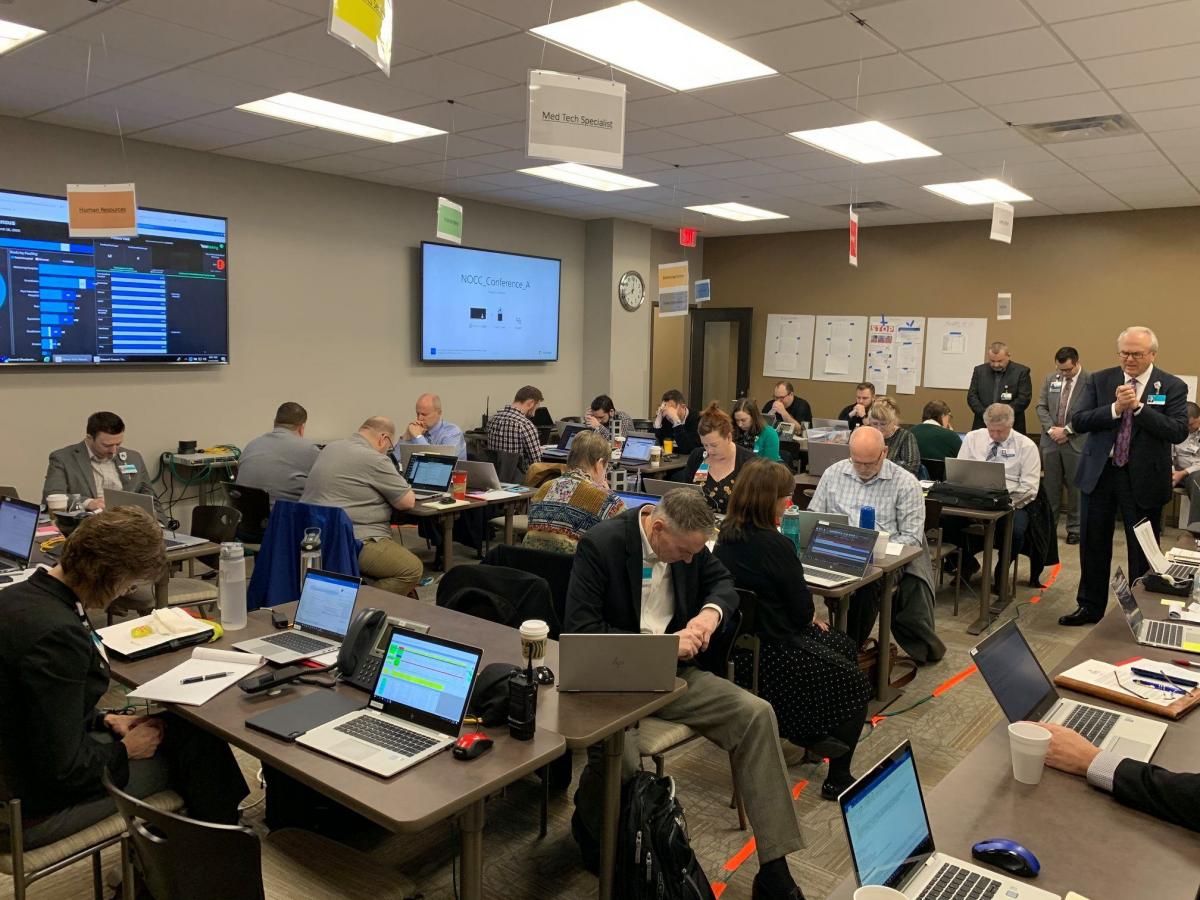 While churches ramped up digital nurturing, Kettering Adventist HealthCare (staff pictured above) in Ohio and Adventist HealthCare (AHC) in Maryland kicked into overdrive to handle the predicted surge of patients in the communities they serve.
While churches ramped up digital nurturing, Kettering Adventist HealthCare (staff pictured above) in Ohio and Adventist HealthCare (AHC) in Maryland kicked into overdrive to handle the predicted surge of patients in the communities they serve.
Kettering staff set up a 24/7 incident command center to manage needs, logistics and communication for all nine of its hospitals and 100-plus outpatient clinics.
AHC took unprecedented measures to prepare their facilities and employees, coordinating extensive collaboration among its teams of caregivers and facility administrators, and also with regional, county and state agencies.
“Even as we look forward to getting back to our daily lives, we are forever changed and will remember how we came together to support our patients, community and each other,” says Terry Forde, AHC president and CEO.
Ministry Meets New Realities
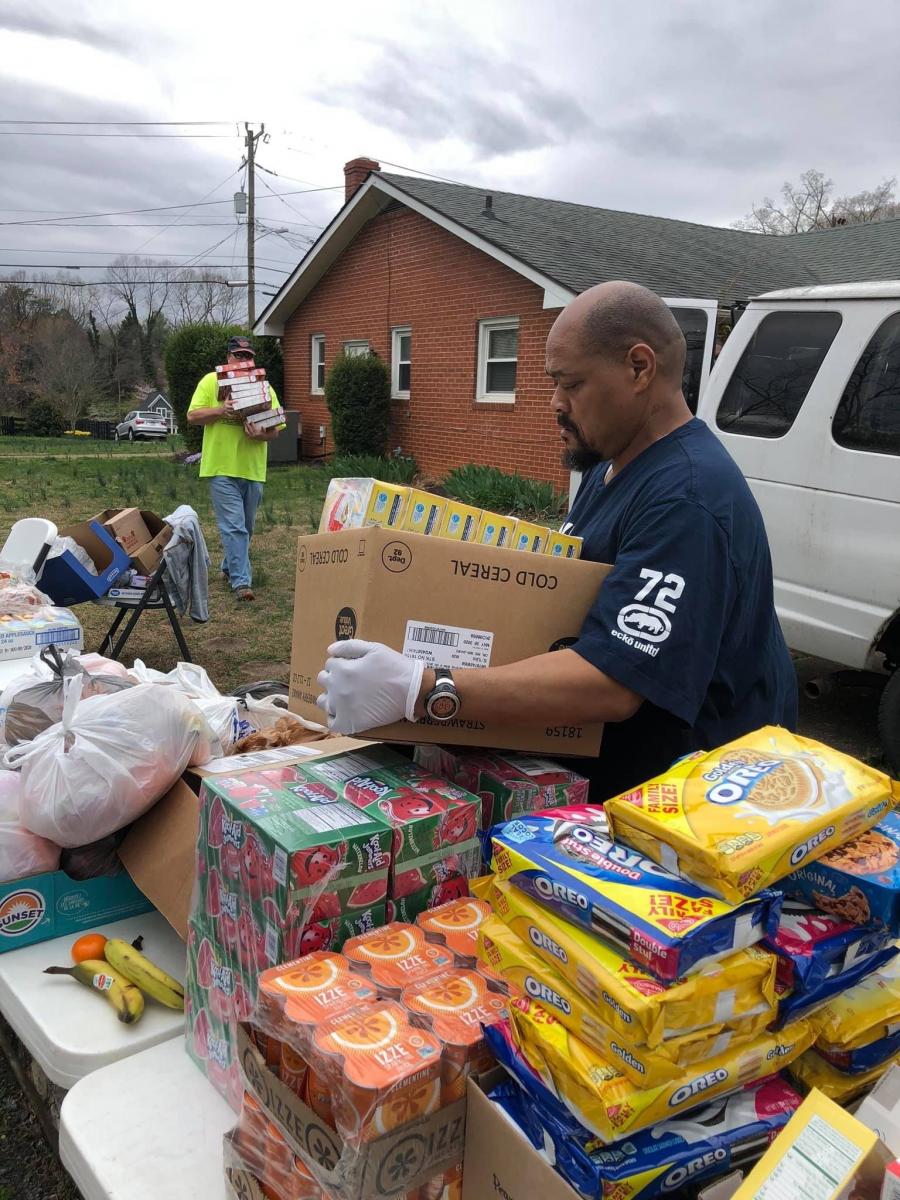 Outreach ministries also adjusted to the new reality and continued to try to meet the needs of vulnerable community members.
Outreach ministries also adjusted to the new reality and continued to try to meet the needs of vulnerable community members.
Allegheny West Conference’s Bethany church in Charlottesville, Va., closed their pantry’s normal operations and opened a drive-through option to ensure social distancing. Members of Allegheny East Conference’s Mount Olivet church in Camden, N.J., moved their regular food distribution event outside to distribute assembled bags of food.
The New Jersey Conference adopted an idea started by Hackettstown member David Nazaire who called on young members to adopt older members to regularly check on them and provide for their needs.
Chesapeake Conference’s Adventist Community Services and Disaster Response team set up a spiritual and emotional support care line and assisted local emergency organizations by providing medical protective gear for health care workers.
WGTS 91.9 co-host Stacey Stone hosted a live prayer meeting each afternoon on the station’s Facebook page, providing an encouraging message and praying for listeners as they posted prayer requests online. The other on-air hosts presented devotionals on the topics of hope and fear on the web and social media.
 Church leaders found creative ways to connect, such as Chesapeake Conference’s Highland View church in Hagerstown, Md., and Beltsville’s campuses that offered sanitized communion supplies so members could take part in communion from home. Students at Washington Adventist University in Takoma Park, Md., held a virtual study hall to combat isolation, and, across the union, individual members creatively reached out to help.
Church leaders found creative ways to connect, such as Chesapeake Conference’s Highland View church in Hagerstown, Md., and Beltsville’s campuses that offered sanitized communion supplies so members could take part in communion from home. Students at Washington Adventist University in Takoma Park, Md., held a virtual study hall to combat isolation, and, across the union, individual members creatively reached out to help.
Anita Jones, a member of Mountain View Conference’s church plant in Hurricane, W.Va., and her daughters, Jaeda and Haven, created and delivered 25 cards to a local senior living community “to lift their spirits during this scary time,” she says.
Hitting the Books—Virtually
As a result of the COVID-19 pandemic, teachers, students and parents submerged into distance learning. All Columbia Union schools—including Kettering College and Washington Adventist University—closed campuses and moved to online or distance instruction, with reopen dates unknown at the time of publishing.
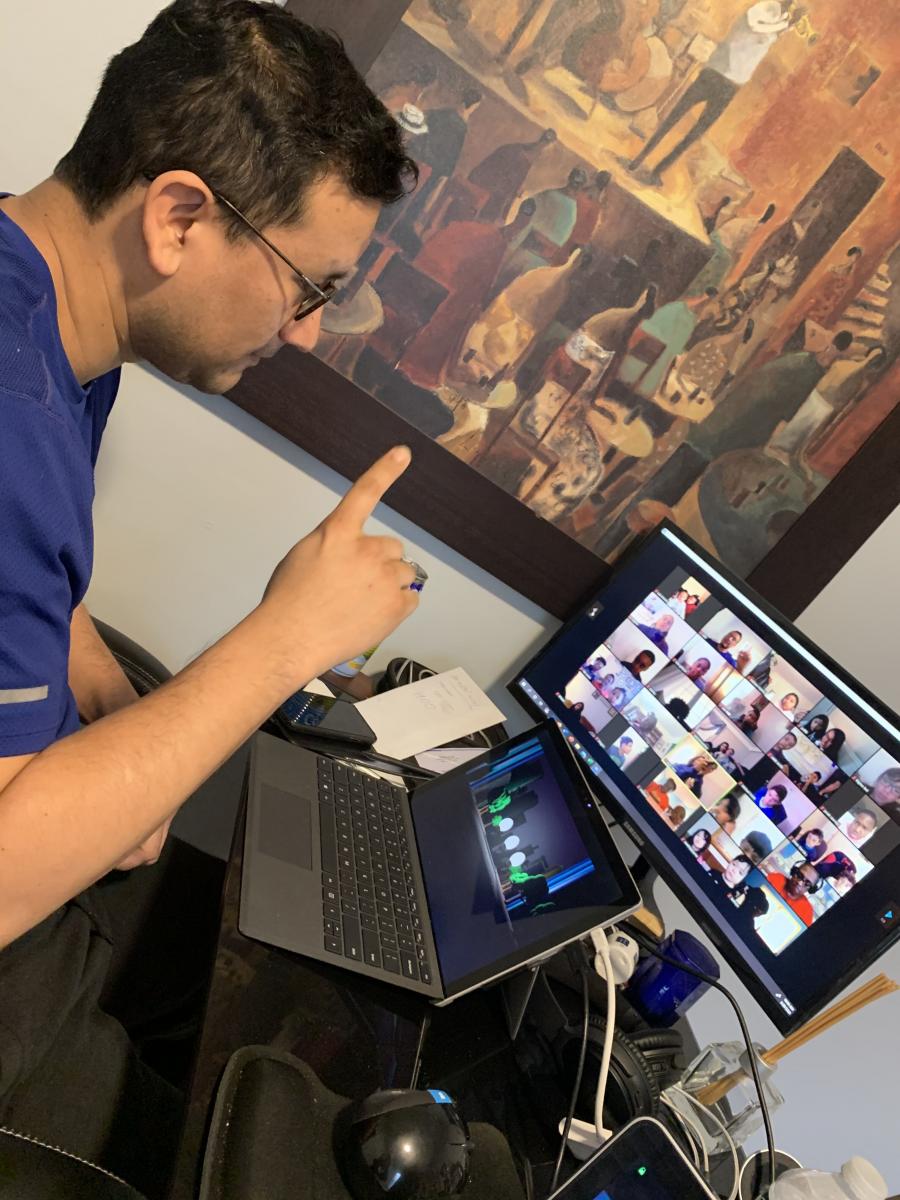 Educators employed various methods of instruction to keep their students and communities connected, including virtual classes, worships and online assignments. From daily story times on Facebook and creating videos for social studies classes to worshipping together via Zoom, they found a way to keep teaching.
Educators employed various methods of instruction to keep their students and communities connected, including virtual classes, worships and online assignments. From daily story times on Facebook and creating videos for social studies classes to worshipping together via Zoom, they found a way to keep teaching.
Union and conference leaders also added to the virtual ways they communicate with constituents. Pennsylvania Conference staff set up several Facebook groups to connect and motivate members in areas like healthy living, and also hosted a weekly Sabbath School and church livestream on Facebook and YouTube. Allegheny East Conference and the Columbia Union communication staff hosted live events on social media to provide news and ministry updates, tips and inspiration, resources and a sense of connection for members scattered across many states.
Reflecting on how church culture may change beyond the coronavirus, Lombard says, “Although we have great worship services, programs and events, we need to continue to improve in the area of relationships. … [Senior] Pastor Chad Stuart said to our [church] board, ‘When this is over, if things go back to the way they were, then we as a church will have missed a huge opportunity.’”
Related Articles and Resources
- 5 Ways Columbia Union Members are Creating Community
- Adventists Adjust to Social Distancing--The New Normal
- Adventist Community Services of Greater Washington to Distribute Diapers
- Adventist Leaders Discuss Options for Upcoming General Conference Session
- Andrews University Transitions to Distance Education
- Blue Mountain Academy Student Ministers While Distance Learning
- Columbia Union Conference Pathfinder Bible Exchange Postponed
- Columbia Union Designates Special Day of Prayer, Sabbath March 28
- Drive-By 'Parade of Compassion' Connects Community
- Doctors Declare New Jersey Adventist Patient a Miracle
- Estimada familia de la Unión de Columbia
- Help Maryland Families During Coronavirus Shutdown
- How is COVID-19 Impacting Columbia Union Business Owners?
- How to Give Tithes and Offerings Online
- How to Help During the Coronavirus Outbreak
- How to Help Your Church Go Digital (Lots of resources)
- How to Support Older Adults
- Information Regarding COVID-19 from Adventist Risk Management
- Maryland Nurse Shares How Frontline Workers Provide More Than Just Medical Care
- Mount Olivet Members Answer Call to Service
- NAD Administration Provides Guidance for Church in North America During the COVID-19 Pandemic
- Tips for Your Behavioral Health During an Infectious Disease Outbreak
- Visitor Team to host Conversation Series on Impact of Covid-19
- Watch Visitor News Live Episodes
- Where God Wants Me to Be
- WGTS 91.9 Launches "Hope-Filled Fridays Campaign"
- World Church Executive Committee Votes to Postpone General Conference Session

Add new comment